Yingying Li
FreeOrbit4D: Training-Free Arbitrary Camera Redirection for Monocular Videos via Geometry-Complete 4D Reconstruction
Jan 26, 2026Abstract:Camera redirection aims to replay a dynamic scene from a single monocular video under a user-specified camera trajectory. However, large-angle redirection is inherently ill-posed: a monocular video captures only a narrow spatio-temporal view of a dynamic 3D scene, providing highly partial observations of the underlying 4D world. The key challenge is therefore to recover a complete and coherent representation from this limited input, with consistent geometry and motion. While recent diffusion-based methods achieve impressive results, they often break down under large-angle viewpoint changes far from the original trajectory, where missing visual grounding leads to severe geometric ambiguity and temporal inconsistency. To address this, we present FreeOrbit4D, an effective training-free framework that tackles this geometric ambiguity by recovering a geometry-complete 4D proxy as structural grounding for video generation. We obtain this proxy by decoupling foreground and background reconstructions: we unproject the monocular video into a static background and geometry-incomplete foreground point clouds in a unified global space, then leverage an object-centric multi-view diffusion model to synthesize multi-view images and reconstruct geometry-complete foreground point clouds in canonical object space. By aligning the canonical foreground point cloud to the global scene space via dense pixel-synchronized 3D--3D correspondences and projecting the geometry-complete 4D proxy onto target camera viewpoints, we provide geometric scaffolds that guide a conditional video diffusion model. Extensive experiments show that FreeOrbit4D produces more faithful redirected videos under challenging large-angle trajectories, and our geometry-complete 4D proxy further opens a potential avenue for practical applications such as edit propagation and 4D data generation. Project page and code will be released soon.
A Multi-Level Framework for Multi-Objective Hypergraph Partitioning: Combining Minimum Spanning Tree and Proximal Gradient
Sep 26, 2025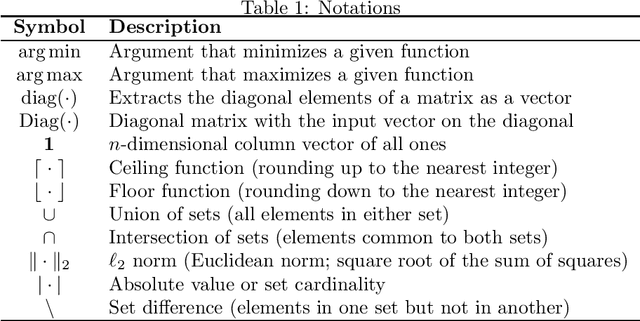
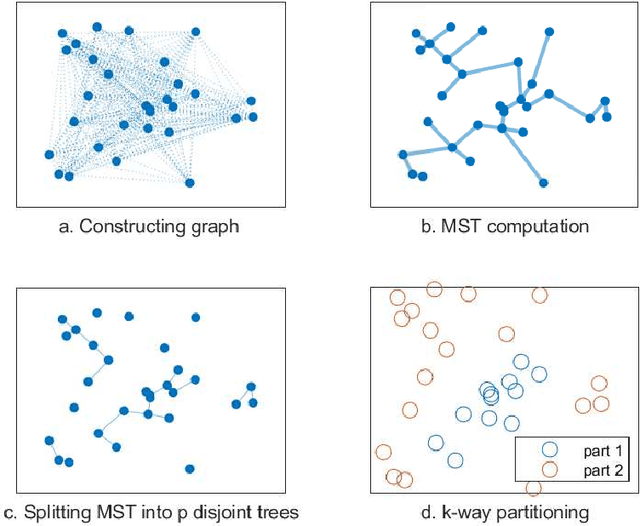


Abstract:This paper proposes an efficient hypergraph partitioning framework based on a novel multi-objective non-convex constrained relaxation model. A modified accelerated proximal gradient algorithm is employed to generate diverse $k$-dimensional vertex features to avoid local optima and enhance partition quality. Two MST-based strategies are designed for different data scales: for small-scale data, the Prim algorithm constructs a minimum spanning tree followed by pruning and clustering; for large-scale data, a subset of representative nodes is selected to build a smaller MST, while the remaining nodes are assigned accordingly to reduce complexity. To further improve partitioning results, refinement strategies including greedy migration, swapping, and recursive MST-based clustering are introduced for partitions. Experimental results on public benchmark sets demonstrate that the proposed algorithm achieves reductions in cut size of approximately 2\%--5\% on average compared to KaHyPar in 2, 3, and 4-way partitioning, with improvements of up to 35\% on specific instances. Particularly on weighted vertex sets, our algorithm outperforms state-of-the-art partitioners including KaHyPar, hMetis, Mt-KaHyPar, and K-SpecPart, highlighting its superior partitioning quality and competitiveness. Furthermore, the proposed refinement strategy improves hMetis partitions by up to 16\%. A comprehensive evaluation based on virtual instance methodology and parameter sensitivity analysis validates the algorithm's competitiveness and characterizes its performance trade-offs.
iDiT-HOI: Inpainting-based Hand Object Interaction Reenactment via Video Diffusion Transformer
Jun 15, 2025Abstract:Digital human video generation is gaining traction in fields like education and e-commerce, driven by advancements in head-body animation and lip-syncing technologies. However, realistic Hand-Object Interaction (HOI) - the complex dynamics between human hands and objects - continues to pose challenges. Generating natural and believable HOI reenactments is difficult due to issues such as occlusion between hands and objects, variations in object shapes and orientations, and the necessity for precise physical interactions, and importantly, the ability to generalize to unseen humans and objects. This paper presents a novel framework iDiT-HOI that enables in-the-wild HOI reenactment generation. Specifically, we propose a unified inpainting-based token process method, called Inp-TPU, with a two-stage video diffusion transformer (DiT) model. The first stage generates a key frame by inserting the designated object into the hand region, providing a reference for subsequent frames. The second stage ensures temporal coherence and fluidity in hand-object interactions. The key contribution of our method is to reuse the pretrained model's context perception capabilities without introducing additional parameters, enabling strong generalization to unseen objects and scenarios, and our proposed paradigm naturally supports long video generation. Comprehensive evaluations demonstrate that our approach outperforms existing methods, particularly in challenging real-world scenes, offering enhanced realism and more seamless hand-object interactions.
AudCast: Audio-Driven Human Video Generation by Cascaded Diffusion Transformers
Mar 25, 2025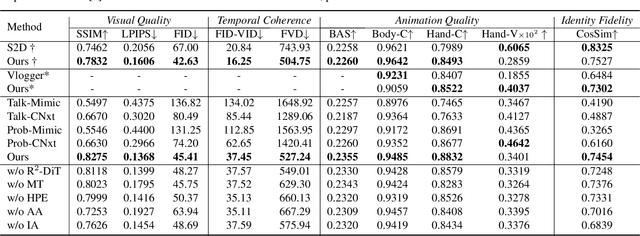
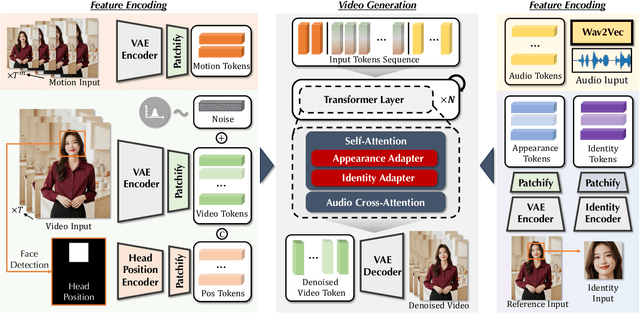
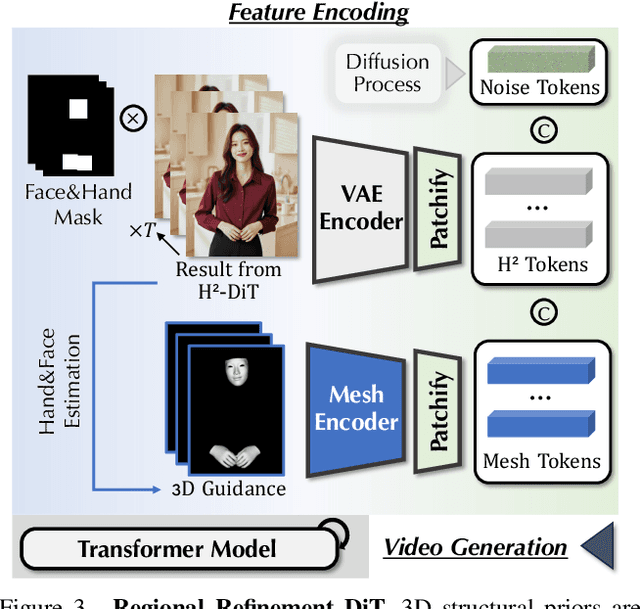
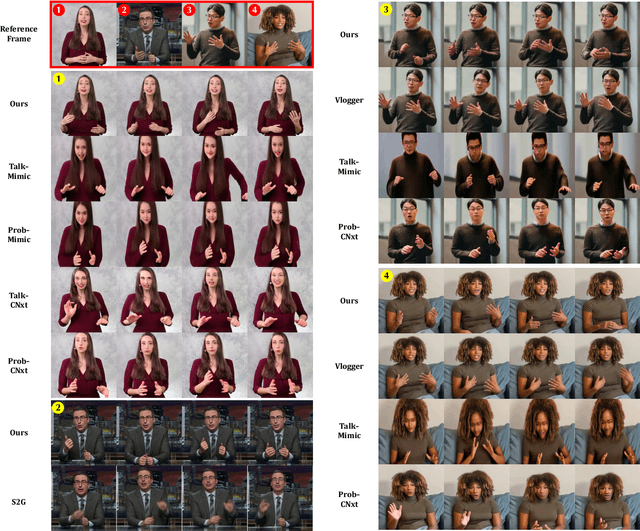
Abstract:Despite the recent progress of audio-driven video generation, existing methods mostly focus on driving facial movements, leading to non-coherent head and body dynamics. Moving forward, it is desirable yet challenging to generate holistic human videos with both accurate lip-sync and delicate co-speech gestures w.r.t. given audio. In this work, we propose AudCast, a generalized audio-driven human video generation framework adopting a cascade Diffusion-Transformers (DiTs) paradigm, which synthesizes holistic human videos based on a reference image and a given audio. 1) Firstly, an audio-conditioned Holistic Human DiT architecture is proposed to directly drive the movements of any human body with vivid gesture dynamics. 2) Then to enhance hand and face details that are well-knownly difficult to handle, a Regional Refinement DiT leverages regional 3D fitting as the bridge to reform the signals, producing the final results. Extensive experiments demonstrate that our framework generates high-fidelity audio-driven holistic human videos with temporal coherence and fine facial and hand details. Resources can be found at https://guanjz20.github.io/projects/AudCast.
Cosh-DiT: Co-Speech Gesture Video Synthesis via Hybrid Audio-Visual Diffusion Transformers
Mar 13, 2025Abstract:Co-speech gesture video synthesis is a challenging task that requires both probabilistic modeling of human gestures and the synthesis of realistic images that align with the rhythmic nuances of speech. To address these challenges, we propose Cosh-DiT, a Co-speech gesture video system with hybrid Diffusion Transformers that perform audio-to-motion and motion-to-video synthesis using discrete and continuous diffusion modeling, respectively. First, we introduce an audio Diffusion Transformer (Cosh-DiT-A) to synthesize expressive gesture dynamics synchronized with speech rhythms. To capture upper body, facial, and hand movement priors, we employ vector-quantized variational autoencoders (VQ-VAEs) to jointly learn their dependencies within a discrete latent space. Then, for realistic video synthesis conditioned on the generated speech-driven motion, we design a visual Diffusion Transformer (Cosh-DiT-V) that effectively integrates spatial and temporal contexts. Extensive experiments demonstrate that our framework consistently generates lifelike videos with expressive facial expressions and natural, smooth gestures that align seamlessly with speech.
TopoSD: Topology-Enhanced Lane Segment Perception with SDMap Prior
Nov 22, 2024



Abstract:Recent advances in autonomous driving systems have shifted towards reducing reliance on high-definition maps (HDMaps) due to the huge costs of annotation and maintenance. Instead, researchers are focusing on online vectorized HDMap construction using on-board sensors. However, sensor-only approaches still face challenges in long-range perception due to the restricted views imposed by the mounting angles of onboard cameras, just as human drivers also rely on bird's-eye-view navigation maps for a comprehensive understanding of road structures. To address these issues, we propose to train the perception model to "see" standard definition maps (SDMaps). We encode SDMap elements into neural spatial map representations and instance tokens, and then incorporate such complementary features as prior information to improve the bird's eye view (BEV) feature for lane geometry and topology decoding. Based on the lane segment representation framework, the model simultaneously predicts lanes, centrelines and their topology. To further enhance the ability of geometry prediction and topology reasoning, we also use a topology-guided decoder to refine the predictions by exploiting the mutual relationships between topological and geometric features. We perform extensive experiments on OpenLane-V2 datasets to validate the proposed method. The results show that our model outperforms state-of-the-art methods by a large margin, with gains of +6.7 and +9.1 on the mAP and topology metrics. Our analysis also reveals that models trained with SDMap noise augmentation exhibit enhanced robustness.
MGMapNet: Multi-Granularity Representation Learning for End-to-End Vectorized HD Map Construction
Oct 10, 2024
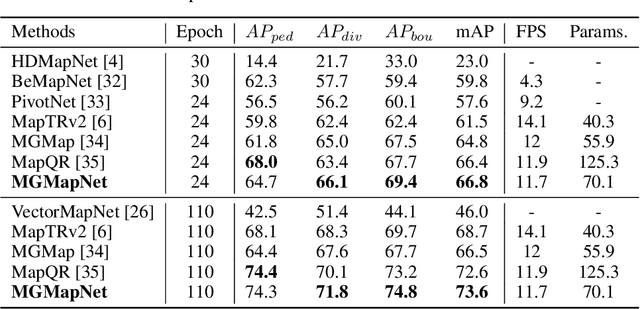
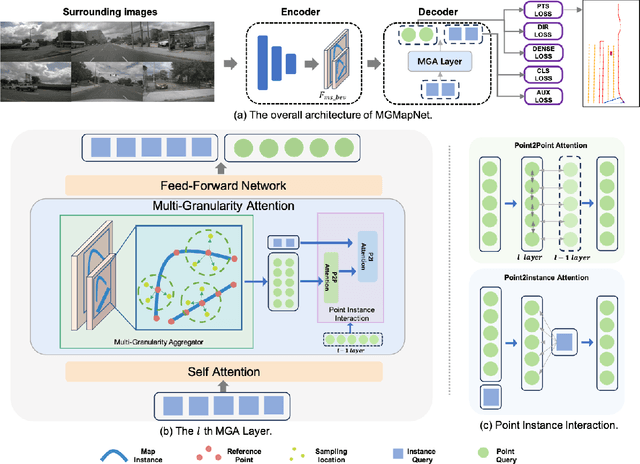

Abstract:The construction of Vectorized High-Definition (HD) map typically requires capturing both category and geometry information of map elements. Current state-of-the-art methods often adopt solely either point-level or instance-level representation, overlooking the strong intrinsic relationships between points and instances. In this work, we propose a simple yet efficient framework named MGMapNet (Multi-Granularity Map Network) to model map element with a multi-granularity representation, integrating both coarse-grained instance-level and fine-grained point-level queries. Specifically, these two granularities of queries are generated from the multi-scale bird's eye view (BEV) features using a proposed Multi-Granularity Aggregator. In this module, instance-level query aggregates features over the entire scope covered by an instance, and the point-level query aggregates features locally. Furthermore, a Point Instance Interaction module is designed to encourage information exchange between instance-level and point-level queries. Experimental results demonstrate that the proposed MGMapNet achieves state-of-the-art performance, surpassing MapTRv2 by 5.3 mAP on nuScenes and 4.4 mAP on Argoverse2 respectively.
On the Convergence Rates of Set Membership Estimation of Linear Systems with Disturbances Bounded by General Convex Sets
Jun 01, 2024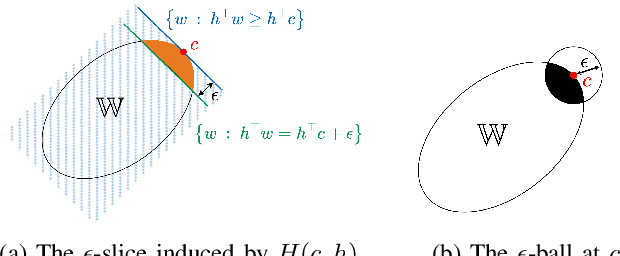
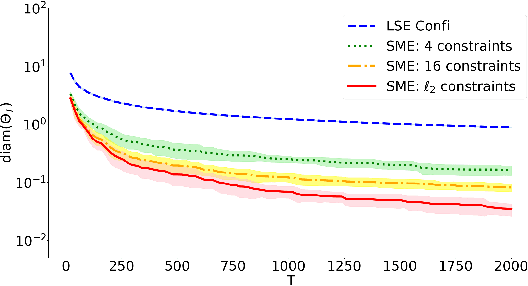
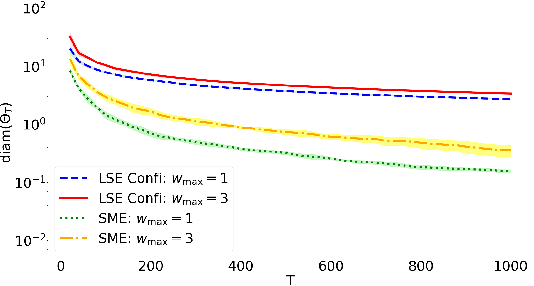
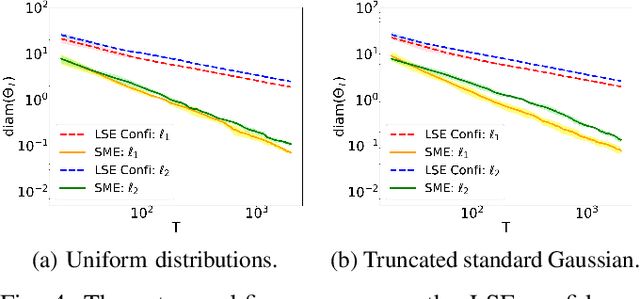
Abstract:This paper studies the uncertainty set estimation of system parameters of linear dynamical systems with bounded disturbances, which is motivated by robust (adaptive) constrained control. Departing from the confidence bounds of least square estimation from the machine-learning literature, this paper focuses on a method commonly used in (robust constrained) control literature: set membership estimation (SME). SME tends to enjoy better empirical performance than LSE's confidence bounds when the system disturbances are bounded. However, the theoretical guarantees of SME are not fully addressed even for i.i.d. bounded disturbances. In the literature, SME's convergence has been proved for general convex supports of the disturbances, but SME's convergence rate assumes a special type of disturbance support: $l_\infty$ ball. The main contribution of this paper is relaxing the assumption on the disturbance support and establishing the convergence rates of SME for general convex supports, which closes the gap on the applicability of the convergence and convergence rates results. Numerical experiments on SME and LSE's confidence bounds are also provided for different disturbance supports.
Gradient-based Sampling for Class Imbalanced Semi-supervised Object Detection
Mar 22, 2024



Abstract:Current semi-supervised object detection (SSOD) algorithms typically assume class balanced datasets (PASCAL VOC etc.) or slightly class imbalanced datasets (MS-COCO, etc). This assumption can be easily violated since real world datasets can be extremely class imbalanced in nature, thus making the performance of semi-supervised object detectors far from satisfactory. Besides, the research for this problem in SSOD is severely under-explored. To bridge this research gap, we comprehensively study the class imbalance problem for SSOD under more challenging scenarios, thus forming the first experimental setting for class imbalanced SSOD (CI-SSOD). Moreover, we propose a simple yet effective gradient-based sampling framework that tackles the class imbalance problem from the perspective of two types of confirmation biases. To tackle confirmation bias towards majority classes, the gradient-based reweighting and gradient-based thresholding modules leverage the gradients from each class to fully balance the influence of the majority and minority classes. To tackle the confirmation bias from incorrect pseudo labels of minority classes, the class-rebalancing sampling module resamples unlabeled data following the guidance of the gradient-based reweighting module. Experiments on three proposed sub-tasks, namely MS-COCO, MS-COCO to Object365 and LVIS, suggest that our method outperforms current class imbalanced object detectors by clear margins, serving as a baseline for future research in CI-SSOD. Code will be available at https://github.com/nightkeepers/CI-SSOD.
Wakening Past Concepts without Past Data: Class-Incremental Learning from Online Placebos
Oct 24, 2023Abstract:Not forgetting old class knowledge is a key challenge for class-incremental learning (CIL) when the model continuously adapts to new classes. A common technique to address this is knowledge distillation (KD), which penalizes prediction inconsistencies between old and new models. Such prediction is made with almost new class data, as old class data is extremely scarce due to the strict memory limitation in CIL. In this paper, we take a deep dive into KD losses and find that "using new class data for KD" not only hinders the model adaption (for learning new classes) but also results in low efficiency for preserving old class knowledge. We address this by "using the placebos of old classes for KD", where the placebos are chosen from a free image stream, such as Google Images, in an automatical and economical fashion. To this end, we train an online placebo selection policy to quickly evaluate the quality of streaming images (good or bad placebos) and use only good ones for one-time feed-forward computation of KD. We formulate the policy training process as an online Markov Decision Process (MDP), and introduce an online learning algorithm to solve this MDP problem without causing much computation costs. In experiments, we show that our method 1) is surprisingly effective even when there is no class overlap between placebos and original old class data, 2) does not require any additional supervision or memory budget, and 3) significantly outperforms a number of top-performing CIL methods, in particular when using lower memory budgets for old class exemplars, e.g., five exemplars per class.
 Add to Chrome
Add to Chrome Add to Firefox
Add to Firefox Add to Edge
Add to Edge